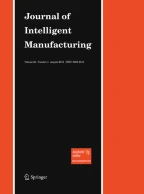Abstract
Minimum spanning tree problem is a typical and fundamental problem in combinatorial optimization. Most of the existing literature is devoted to the case with deterministic or random weights. However, due to lack of data, a proportion of edge weights have to be estimated according to experts’ evaluations, which may be considered as uncertain variables. This paper focuses on the case where some weights are random variables and the others are uncertain variables. The concept of an ideal chance distribution is introduced and its expression is given based on the uncertainty distributions and probability distributions. A model is formulated to find a minimum spanning tree whose chance distribution is the closest to the ideal one. Finally, a numerical example is given to illustrate the modelling idea of the study.
Similar content being viewed by others
References
Bertsimas, D. J. (1990). The probabilistic minimum spanning tree problem. Networks, 20(3), 245–275.
Borüvka, O. (1926). O jistém problému minimálním. Práce Mor. Přírodovéd. Spol. v Brně, 3, 37–58.
Dijkstra, E. W. (1959). A note on two problems in connexion with graphs. Numerische Mathematik, 1(1), 269–271.
Frieze, A. M. (1985). On the value of a random minimum spanning tree problem. Discret Applied Mathematics, 10(1), 47–56.
Frank, H., & Hakimi, S. L. (1965). Probabilistic flows through a communication network. IEEE Transactions on Circuit Theory, 12, 413–414.
Gao, Y. (2011). Shortest path problem with uncertain arc lengths. Computers and Mathematics with Applications, 62(6), 2591–2600.
Gao, J. W., & Yao, K. (2015). Some concepts and theorems of uncertain random process. International Journal of Intelligent Systems, 30(1), 52–65.
Guo, H. Y., & Wang, X. S. (2014). Variance of uncertain random variables. Journal of Uncertainty Analysis and Applications, 2, 6.
Hou, Y. C. (2014). Subadditivity of chance measure. Journal of Uncertainty Analysis and Applications, 2, 14.
Ke, H., Su, T. Y., & Ni, Y. D. (2015). Uncertain random multilevel programming with application to product control problem. Soft Computing (to be published).
Ishii, H., Shiode, S., Nishida, T., & Namasuya, Y. (1981). Stochastic spanning tree problem. Discrete Applied Mathematics, 3(4), 263–273.
Ishii, H., & Matsutomi, T. (1995). Confidence regional method of stochastic spanning tree problem. Mathematical and Computer Modelling, 22(10), 77–82.
Kruskal, J. B. (1956). On the shortest spanning tree subtree of a graph and the traveling salesman problem. Proceedings of the American Mathematical Society, 7(1), 48–50.
Liu, B. (2007). Uncertainty theory (2nd ed.). Berlin: Springer.
Liu, B. (2009a). Some research problems in uncertainty theory. Journal of Uncertain Systems, 3(1), 3–10.
Liu, B. (2009b). Theory and practice of uncertain programming (2nd ed.). Berlin: Springer.
Liu, B. (2010). Uncertainty theory: A branch of mathematics for modeling human uncertainty. Berlin: Springer.
Liu, B. (2014). Uncertain random graph and uncertain random network. Journal of Uncertain Systems, 8(1), 3–12.
Liu, Y. H., & Ha, M. H. (2010). Expected value of function of uncertain variables. Journal of Uncertain Systems, 4(3), 181–186.
Liu, Y. H. (2013a). Uncertain random variables: A mixture of uncertainty and randomness. Soft Computing, 17(4), 625–634.
Liu, Y. H. (2013b). Uncertain random programming with applications. Fuzzy Optimization and Decision Making, 12(2), 153–169.
Prim, R. C. (1957). Shortest conection networks and some generalizations. Bell System Technical Journal, 36, 1389–1401.
Qin, Z. F. (2013). Uncertain random goal programming. http://orsc.edu.cn/online/130323.
Sheng, Y. H., & Gao, J. W. (2014). Chance distribution of maximum flow of uncertain random network. Journal of Uncertainty Analysis and Applications, 2, 15.
Sheng, Y. H., & Gao, Y. (2015). Shortest path problem of uncertain random network, http://orsc.edu.cn/online/140508.
Sheng, Y. H., & Yao, K. (2014). Some formulas of variance of uncertain random variable. Journal of Uncertainty Analysis and Applications, 2, 12.
Yao, K., & Gao, J. W. (2015). Uncertain random alternating renewal process with application to interval availability. IEEE Transactions on Fuzzy Systems. doi:10.1109/TFUZZ.20142360551.
Zhang, X., Wang, Q. N., & Zhou, J. (2013). Two uncertain programming models for inverse minimum spanning tree problem. Industrial Engineering and Management Systems, 12(1), 9–15.
Zhou, J., He, X., & Wang, K. (2014a). Uncertain quadratic minimum spanning tree problem. Journal of Communications, 9(5), 385–390.
Zhou, J., Chen, L., & Wang, K. (2015). Path optimality conditions for minimum spanning tree problem with uncertain edge weights. International Journal of Uncertainty, Fuzziness & Knowledge-Based Systems. (to be published).
Zhou, J., Yang, F., & Wang, K. (2014b). Multi-objective optimization in uncertain random environments. Fuzzy Optimization and Decision Making, 13(4), 397–413.
Acknowledgments
This work was supported by National Natural Science Foundation of China Grant Nos. 61273044, 61262023 and 71371019.
Author information
Authors and Affiliations
Corresponding author
Rights and permissions
About this article
Cite this article
Sheng, Y., Qin, Z. & Shi, G. Minimum spanning tree problem of uncertain random network. J Intell Manuf 28, 565–574 (2017). https://doi.org/10.1007/s10845-014-1015-3
Received:
Accepted:
Published:
Issue Date:
DOI: https://doi.org/10.1007/s10845-014-1015-3
